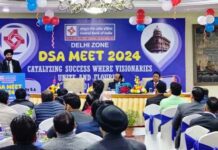
In an opening statement to business leaders here, Dr. Singh said: “I would like to use this opportunity to urge you to oppose efforts to create barriers for Indian IT companies through legislative or administrative measures.”
“These companies are the most ardent champions of India-US relations. The IT and related services sector contributes eight percent of our (India’s) GDP and 25% of our exports. It employs three million people directly. The inability of IT companies to operate in the US market, would not only affect our economy, but also the climate of opinion in India about the economic partnership with the US,” he added.
Dr. Singh further satetd that American firms have adapted to India, offering products and services that are competitive and innovative, and which have done very well. “I hope you recognise the longer term opportunities that lie ahead. For example, we intend to invest more than a trillion dollars in the next five years in the infrastructure sector. The defence sector is another attractive area, because we will place priority on domestic procurement and encourage our private sector in this area,” Dr. Singh said on Friday evening.
“In today’s world, a strong two-way economic and business partnership is the bedrock of a strong bilateral relationship. The business communities in both our countries have played a very important role in the development of the India-US strategic partnership. Our cooperation is now truly broad-based. Apart from trade and investment, we are constructively engaged in energy security, education and research, defence, homeland security and cyber security,” Dr. Singh said.
He said that he had told President Obama during their Oval Office interaction in Washington earlier in the day that despite economic turbulence all around, trade and investment relationship remained a high point of Indo-US engagement. “I am aware that the business community in the United States has some concerns about India’s growth prospects, macroeconomic stability and the economic policy environment. Doubts have been expressed about our sincerity in this regard. This is a mistaken perception. I would like to use this meeting to correct it if I can, and also to understand your points of view. We have an abiding commitment to fostering an economic environment that is open, predictable and transparent, and which is business and investment friendly. We are determined to restore the high momentum of growth of the past decade and maintain macroeconomic stability. We also know that achieving this means more and not less reforms,” Dr. Singh said.
“The process of reforms that began in 1991 has benefited India both in terms of accelerated economic growth as well as rapid reduction in poverty. Virtually all political parties in India, national and regional, have been part of successive governments in India after 1991 and have supported the process of reforms. This gives us confidence about the future direction of our economic policies,” he added.
Stating that his government is committed to getting India back to a sustainable growth path of eight to nine percent, Dr. Singh said the Indian people will not tolerate anything less. “They have tasted the benefits of rapid inclusive economic growth and they want more, not less,” he said.
“The fundamentals of the Indian economy remain strong. India’s overall public-debt to GDP ratio has been on a declining trend from 73.2% of GDP in 2006-07 to 66% in 2012-13. Similarly, India’s external debt is only 21.2% of GDP and short-term debt stands at 5.2% of GDP. Our forex reserves stand at over USD 270 billion, and are more than sufficient to meet India’s external financing requirements,” the Prime Minister said.
“In order to restore growth, our government has implemented a series of reform measures over the last year. We have established a special mechanism to speed up implementation of large projects, especially in the infrastructure sectors. Several decisions have been taken to remove impediments in the way of important projects,” he added.
He also said that the government has taken steps to make India more attractive for foreign direct investment. “FDI limits have been increased in several sectors, including retail and telecom, and restrictions in the banking sector have been eased. The policy regarding FDI in defence has been clarified to indicate that FDI beyond 26% can also be considered on merits,” he said.
“The results of our efforts will be visible in the second half of the year. We expect stronger growth in 2013-14 than in 2012-13. The second half of the year should see a distinct turnaround, partly because of the good monsoon and partly because of the steps we have taken,” he said.
“We are also confident of achieving our medium term objective of reducing the Current Account Deficit to 2.5% of our GDP. At the same time, we will make every effort to maintain a macro-economic framework friendly to foreign capital inflows to enable orderly financing of the Current Account Deficit. A number of tax related concerns of US companies, with wholly owned subsidiaries in India, have been addressed. Some security related restrictions on electronic imports were perceived as disguised protectionism. We have put these restrictions in abeyance and will work to find more acceptable solutions that address our legitimate security needs,” Dr. Singh said.
He assured the American business community that India is committed to the protection of intellectual property. “We recognise that investment and innovation in a country requires such protection. We have strong IPR legislation in India, consistent with our WTO obligations. We are continually trying to strengthen the enforcement mechanisms. There has been one solitary instance so far of compulsory licensing for an anti-cancer drug and there has been one instance when the Supreme Court of India rejected a patent extension claim on a legitimate ground. I look forward to hearing from you on how we can further expand our economic relations,” he concluded.– dnaindia.com































